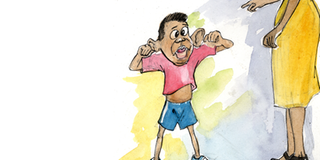Prime
Dealing with an ill-mannered child

What you need to know:
Give them respect
If they were able to complete a task, give them the respect they deserve. This will change their mind set that you are a friend rather than an enemy.
Don’t put them under duress
If there are rules to follow in the home, spell it to them. Avoid using force when assigning different tasks. Ask and don’t command.
Lead
Allow your child to develop their best character. Allow them to feel the results of the decision made. When they discover that they were wrong, they will acknowledge the mistake.
Dealing with an in-disciplined child is very challenging, a parent must find a balance between love and discipline, writes Sarah Achen Kibisi
Jackson is a three year-old boy. He has a five-month-old baby sister. Whenever his parents are at home, he throws tantrums in a bid to attract their attention. He will slap the baby and pour tea on the floor. On average, he gets beaten up between three-five times a day. Something that has become a routine. His parents think beating him with belts, kicking and slapping are proper ways of instilling discipline. To them, their son is already a spoilt child ‘beyond repair’.
A child may become indisciplined when they feel that they have no control over an issue. For a number of parents dealing with such a child is a big challenge. Here are some tips to help you deal with the scenario. According to Mr Mayanja Kajumba, a psychologist at Makerere University, every child has their own behaviour and tends to show it at some point.
On many occasions, parents retaliate with anger since the child has embarrassed them before a guest. It’s very important for a parent to understand that anger will only worsen the situation, instead address the root cause of the behaviour.
Like adults, children are born with their own thinking. In these modern times, parents are busy pursuing their careers and this has deprived them of the opportunity to talk and listen to their children. As parents, it’s our sole responsibility to create time and be with the children which is a challenge.
Spending even a few minutes with a child can mean a lot because it will change their perception of you and instead instill the trust they lost in you. They will open up about anything because they now perceive you as a friend.
Mary Ann Nekesa, a mother of two, says it is every parent’s calling to develop the tradition of give and take. Inculcate the spirit of sharing with others so that when they are not in your presence, they value what you taught them.
It is the obligation of the parents to improve the habit of give and take. Teach them to share toys with their friends while playing. Let your children take toys from friends in exchange for his toys. This way, they will understand that to get something in life they have to give something.
Christina Namutebi, a company secretary of an NGO concurs with Nekesa that parents have to be exemplary in all the things they do. “Remember children learn from you and whatever they will see, they will put into practice. Set a good example at home and they will also oblige,” she says.
Stubborn children will do things because to them it is the right thing. Some of us use force to discipline them, but force will only worsen their behaviour.
Kajumba emphasizes that display of unruly acts such as shouting will render your child uncontrollable.
When you are faced with this kind of issue, remain calm instead of making noise, explain to them how you expect them to conduct themselves. Don’t command them but ask. Do not shout.
Mercy Wadulo, a child counselor advises that when dealing with problems, give your children an opportunity to have a say in the situation. Being children does not mean that they have no input. “On many occasions, we sideline them in problem solving and yet their contribution is critical,” she adds.
This way you will nurture in them a routine of respect and being kind will portray to them that they are valued. If you require of your children to do an assignment, ask politely without offending them.
Paula Mirembe, a guardian of three children says that once in a while, give your child praise where it is due. For example, if they have done a good task assigned, commend them for the job well done or if they behaved well in church, praise them.
Mentioning words such as “You made me happy by helping with the dishes’’. Remember the praises should follow the accomplished task not later and should be genuine.
Allow your child to develop their best character. Allow them to feel the results of the decision made. When they discover that they were wrong, they will acknowledge the mistake.




